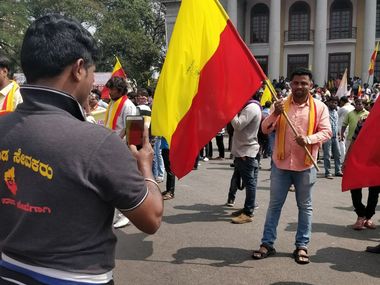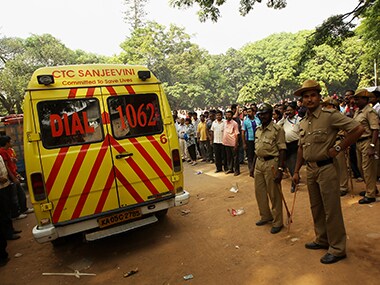On 9 January, 2018, Bengaluru resident Razia Khan logged on to the website of St Germain School in the city as soon as online registrations opened — she wanted to get her 5-year-old son admitted to lower kindergarten. Even as she clicked on the ‘Online Application’ tab, her hopes were dashed. A message popped up saying ‘Registrations Completed’.
The reason for this mad rush? St Germain School is one of the few private schools in Bengaluru that offer quality education at an affordable fee — Rs 50,000 admission fee and Rs 20,000 tuition fee annually. In most private schools in the city, fees go are a couple of lakhs. An IT professional, seeking anonymity, says he pays Rs 1.5 lakh as tuition fee annually for his daughter studying in Class IV at Deen’s Academy, Whitefield. “I don’t know how much I will end up paying (in school fees) by the time my daughter reaches college.”
This is the story of every middle-class parent in Bengaluru and in other tier-I Indian cities. Most schools are fleecing parents and flouting government norms openly. One can expect an admission call only if they declare a hefty income in the admission inquiry form. Parents visiting schools are often greeted with notices such as these:
Middle-income folks, whose annual income is between Rs 3.5-10 lakh, are the worst hit. They don’t want to send their children to government schools. And educating them at private schools is burning a deep hole in their pockets. A rudimentary analysis of fees at popular non-elite, private CBSE and ICSE schools — Presidency School and Florence School, Ryan International, Deen's Academy and Dhee Global School — in Bengaluru revealed that the average annual tuition fee in 2017-18 was between Rs 1,00,000-1,50,000 per student per year. Parents have to shell out another Rs 8,000-12,000 for books, uniforms, and stationery, which too are sold by the schools. Then there’s the transportation fee, which depends on the distance a student travels.
The ASSOCHAM Social Development Foundation (ASDF) conducted a random survey in May 2015 on the rise in private school fees. The report says: “School expenses of a single child, including tuition fees, have risen from Rs 55,000 in 2005 to Rs 1,25,000 per annum in 2015.”
It noted, “It is becoming difficult for salaried parents in big cities to afford tuition fee and other expenses, which have gone up by 150 percent in the last 10 years.”
School fees higher than college fees!
School fees today are higher than engineering college fees, which range between Rs 20,000 and Rs 35,000 annually. A 2007 report by the Unesco Institute for Statistics which focused on the financials of education in 200 countries says, “The household contribution drops to 14 percent (for university education), exactly half of what the middle-class spends on primary and secondary education.”
Most parents who spoke to Firstpost say they have other financial commitments — EMIs of the house, car or personal loans, medical expenses of ageing parents, insurance premiums — as well, and that exorbitant school fees make it hard for them to meet these. A software project lead with an IT firm in Bengaluru, who wanted to remain anonymous, says, “I spent about Rs 1,00,000 last year to admit my child to Class I in Presidency school, R.T. Nagar, and paid another Rs 60,000 in tuition fee, apart from other expenses. I am worried how will I finance my second child’s education.”
Government norms flouted openly
A draft notification issued by the Education Secretariat of Karnataka on 6 July, 2017, which Firstpost has access to, warns private bodies that run schools: “The concerned bodies shall have been formed on non-proprietary and non-profit sharing basis… The funds of the institution shall not be channelised for purposes other than furthering education…”
Further, the Karnataka Education Act 1983 provides a formula for calculation of tuition fee: It should account for the salaries of the teaching and non-teaching staff, plus 30% of the recurring expenditure, divided by the number of students. The Act also stipulates that schools should not charge any term fees up to Class V, and that they charge nominal term fees for higher classes.
But this formula is hardly followed in any private school. In 2016, officials of the Department of Public Instruction conducted a survey of 17 schools in Bengaluru and found that schools were charging up to 138% of the recurring expenses. The Karnataka Education (Second amendment) Bill, 2017 proposed a new fee calculation formula, which would enable schools to charge additional fee based on their geographical location, but is yet to come into effect.
Software engineer Vinodh Rajaraman, 39, who started a movement in Bengaluru in 2015 and filed a PIL in September 2016 in the Karnataka High Court for regulation of school fees, says, “A school of 1,000 students with a yearly fee of Rs 1 lakh easily makes Rs 10 crore a year, apart from other incomes such as admission fee and uniform charges, excluding expenses of salaries and building rent.”
It’s not only people in Bengaluru who are bearing the brunt of schools charging tuition fees arbitrarily. Parents in many Indian cities have organised themselves to fight against unregulated fee hikes by private schools.
The sharp increase in the number of private schools in Bengaluru shows how lucrative the school business is. According to a report by the Department of Public Instruction, there was a four-fold increase in the number of private schools between 2009 and 2014 in Bengaluru — the numbers stand at 1,377 in south and 937 in north Bengaluru.
Challenges posed by the RTE
According to Article 21A of the Constitution of India, it is mandatory for the State to provide free education from ages six to 14. However, the Right of Children to Free and Compulsory Education Act, 2009, which was inserted as a sub-clause to article 21A, doesn’t help the middle-income class. The Act puts several restrictions — only families with income below Rs 3.5 lakh are eligible to apply for seats under the RTE Act; schools must be located within the ward of the parents seeking admission etc — on admission under the RTE quota.
Free education not just for 25 percent
In an interim order passed on 12 February, 2013 by Justice HG Ramesh, the Karnataka HC observed, “In view of the Article 21(A) of the Constitution of India, children in that age group (6-14) are entitled to free and compulsory education. This is not only applicable for the 25 percent selected by the state as per the RTE, but all the children in the age group of 6-14 years. It is for the state to reimburse the fees fixed by the respective schools." If the government had taken timely steps towards the implementation of this order, it would have left far reaching consequences.
Parents to their own rescue
Abhilash Matlapudi, a 37-year-old project manager at a Bengaluru IT firm, came back from abroad and realized that paying his children’s school fees was going to be really challenging despite his decent salary. He then came up with the idea of founding a school funded and managed by parents in Whitefield area of the city in 2017. “I started a Facebook page seeking people’s opinion on starting a parent-owned school with full transparency. We ended up starting Citizen’s Gurukul.”
Published Date: Feb 03, 2018 19:55 PM | Updated Date: Feb 03, 2018 19:55 PM





















